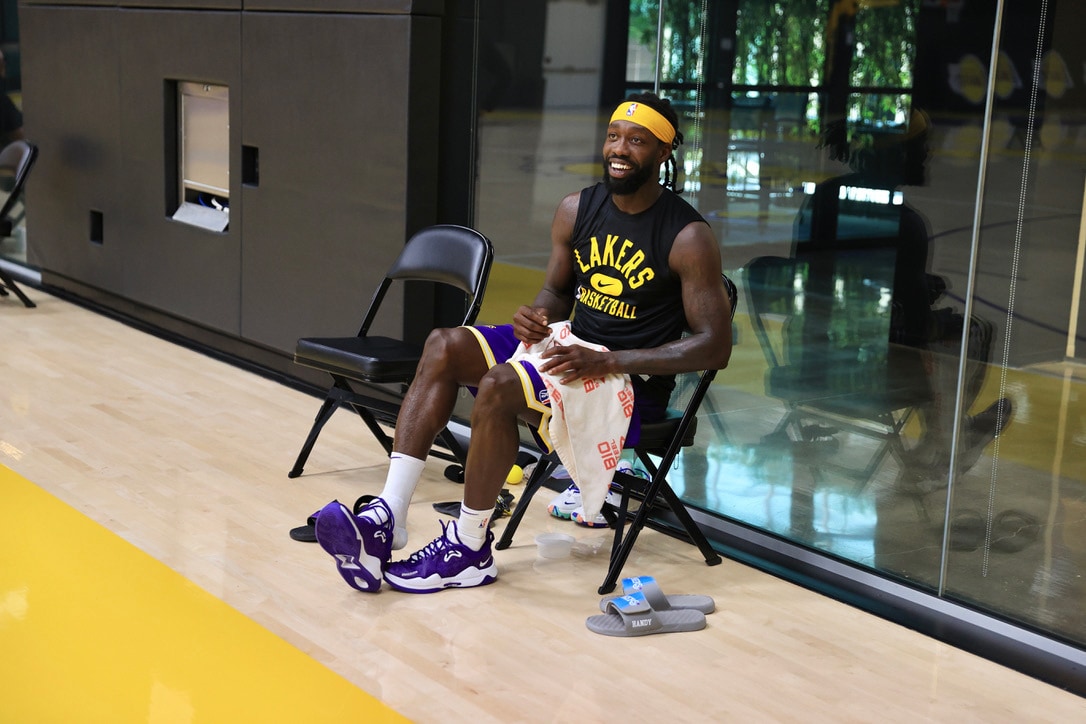On Tuesday afternoon at the UCLA Health Training Center, Patrick Beverley spoke to assembled reporters for the first time since the trade with Utah that made him a Laker.
“What I can add is a willingness to be prepared every day,” Beverley opened. “I’m a very detailed man. Preparation is really big for me. My will ability. Willingness to be at practice on time, willingness to compete every day, willingness to win a lot of games and potentially go to the playoffs. A will factor.”
Beverley’s intensity and competitiveness has helped his teams win games throughout a 10-year NBA career that took him from Houston, to the Clippers, and to Minnesota last season.
“I think he’s going to be a lovely addition to our ball club and a great tone setter,” said his new head coach, Darvin Ham. “The grit, the grind, just being a dog out there… I’m looking forward to him setting a real nice tone, especially on the defensive side of the ball, which we really need to get better at. That’s going to take us where we need to go.”
Throughout his career, one thing about Beverley has been consistent: his teams are better when he’s on the court.
“I just like to win,” he summarized.

Using the eye test to watch some of Beverley’s 526 career games reveals that, but there’s also a summary statistic to measure a player’s on-court impact: net rating.
Below are Beverley’s career regular season net ratings:
Year: NetRtg (Team Rank*)
2012-13: 7.9 (1St)
2013-14: 8.3 (1St)
2014-15: 2.7 (10th)
2015-16: 3.5 (2n.d)
2016-17: 8.4 (T-3rd)
2017-18: 6.0 (1St)
2018-19: 4.0 (2n.d)
2019-20: 10.2 (3rd)
2020-21: 9.0 (3rd)
2020-21: 9.0 (3rd)
2021-22: 3.7 (5th)
*Minimum 10 games played, 15 minutes per game
Net rating measures a team’s point differential per 100 possessions, and therefore, a player’s point differential when they’re on the court. The higher one’s rating, the better his team did when he was on the court.
As we can see, Beverley’s not only been in the positive in each of his 10 seasons, but he’s ranked first on his team three times, second twice and third three times.
“I don’t know a lot about all that,” said Beverley, who said he’s never been about counting stats, either. “I’m gonna just be Pat. I’m going to compete at the highest level and I’m going to have fun doing it, too… I love playing basketball. I’ve been doing this since I was a kid. I love to compete, and I want to take advantage of this opportunity.”
Postseason net rating is more fraught, due not only to the smaller sample size, but to the wide variance in opponents. For example, the 2015-16 Rockets played an all-time great Golden State team, and lost 4-1; Beverley had a net rating of -13.1 … but that was actually third best on the team. So, in the postseason +/-, the rank within one’s team is typically more telling than the actual number:
Postseason +/-
2012-13: 2.8 (2n.d)
2013-14: -0.6 (4th)
2014-15: (DNP: torn ligament, left wrist)
2015-16: -13.1* (3rd)
2016-17: 2.7 (4th)
2017-18: (DNP: right knee surgery)
2018-19: -13.9 (5th)
2019-20: 3.8 (4th)
2020-21: 0.6 (6th)
2020-21: 0.6 (6th)
Generally, Beverley’s net rating and team rank drop a bit in the playoffs. His general edge in intensity and focus is more commonly adopted by teams and players in postseason settings, and he can become more dependent on his teammates as he is not a primary creator on offense. And yet, his impact on teammates remains.
“He cares about his teammates,” said Ham. “He lives and breathes teams. He’s a hell of an individual and team defender. His (impact) is on winning basketball. He’s made his presence felt in a major way.”

An area of concern for Beverley: he suffered a variety of injuries throughout his career that limited him to an average of 52.6 games per season. Last season, Beverley missed one game with left calf soreness, six games due to a left adductor strain, two games with a sore right groin, eight games with a right ankle sprain and one game with an eye injury. Combined with the absence of health and safety protocols, he played in 58 games, starting 54.
Now, if you subtract his rookie year – in which he didn’t play a ton – and his 2017-18 season (11 games played due to a knee injury), his average number of games played looks a bit better, at 59.3. But the most he’s ever played was 78 (2018-19), followed by 71 in 2015-16.
Indeed, his ability to stay healthy for his age 34 season will be important, especially considering the availability of LeBron (45 games played in 2020-21, 56 in 2021-22) and Anthony Davis (36, 40).
Asked how he feels right now, he said, after completing a workout on the Lakers practice court: “Amazing, like I’m 19.”
The Wolves were 33-25 with him last season, and 13-11 without him. As usual, Beverley’s team was better when he was on the floor, which I pointed out at his presser.
“And the Houston Rockets, and the Clippers,” he answered. “I just wanted to make sure you didn’t forget a team… all three of them, I changed the culture. But I’m not here trying to change the culture, I’m just trying to implement what I feel like has worked over the past years, and that’s the (closer) you are, the more you are a team. The more (time) you spend together, the better you’ll be as a team. If we can’t have those tough conversations among each other, you damn sure aren’t going to have them in front of 20,000 people while the crowd is going against you.
“My thing has always been camaraderie, team, team, team. You do that and you play hard, and let the dominoes fall wherever they fall from there.”